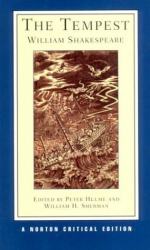|
This section contains 1,462 words (approx. 5 pages at 300 words per page) |

|
Imperialism in the Tempest - a Question of Ethics and Morality
Summary: Analyzes the William Shakespeare play, the Tempest. Explores evidence of imperialism in the play. Discusses the ethics behind many of the character's actions.
When one interacts with strangers, feelings of superiority and inferiority are bound to occur. In Shakespeare's time period, most of the Europeans' perspectives were disrespectful, arrogant, and full of ignorance. Like the Native Americans, for most of the European colonists who landed in the "New World," it was their first exposure to the people of a different race. And yet, their first intuition of the Native Americans was described as barbarians, savages, and cannibals. The Europeans thought themselves as superior compared to the "poor savages"(Takaki 148); likewise in The Tempest, Shakespeare portrayed Prospero as the rightful leader of Caliban's island, just as the Europeans thought of themselves as the rightful rulers of the Americas. However, Prospero did not have the right to exercise authority over Caliban morally and ethically, even though at the time the play was written, it was widely accepted. Hence, The Tempest contains many European...
|
This section contains 1,462 words (approx. 5 pages at 300 words per page) |

|


